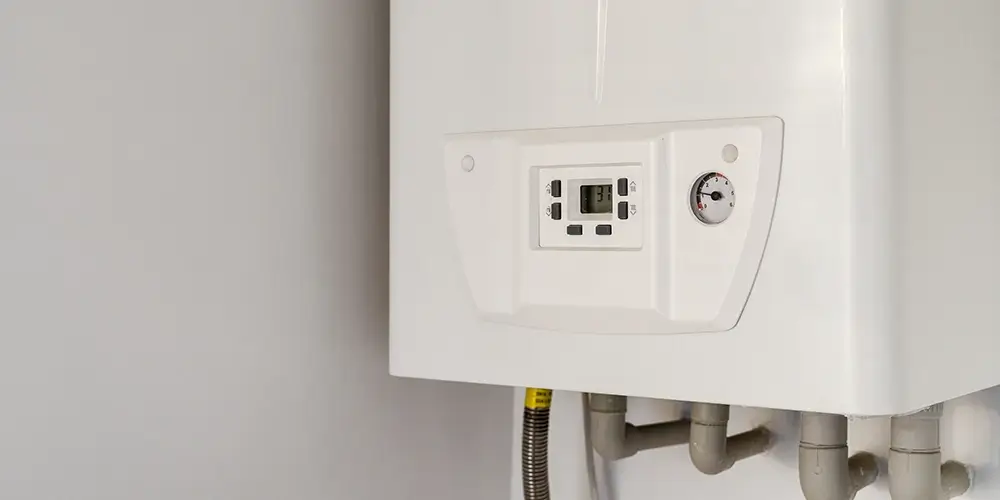Buying a new water heater can be overwhelming. It’s not a question of finding one — that’s easy enough on the internet — but knowing what to buy.
In the old days of black-and-white TV, there was one water heater type — the old boiler-style tank heater — and your “choice” came down to size, fuel type, brand, and dealer. Even your brand choice was vanishingly small. Life was so much simpler then.
But now you’ve got tank heaters, tankless, solar, indirect… It’s enough to make your head fly off into space.
This blog will examine the various water heater types and their pros and cons to help you make the best decision for your home and lifestyle.
The 4 Main Types of Water Heaters
1. Conventional Tank Water Heaters
Tank water heaters store hot water for household use — anywhere from 20 to 80 gallons. Cold water flows into the tank via a dip tube, where gas burners or electric heating elements heat it.
Pros:
- As long as the tank is full, hot water is readily available.
- They typically have a lower purchase price than tankless and solar options.
- These units are straightforward to install and often don’t require special adjustments to your plumbing system.
- Heaters are available in various sizes, making it easy to select one appropriate for your household’s hot water needs.
- Replacement parts are easy to find; repairs are relatively simple.
Cons:
- Water in the tank is constantly heated, whether you’re using it or not, resulting in energy inefficiency.
- The hot water supply may run out if too many people use it consecutively.
- They have a shorter lifespan than other water heaters, lasting 10–15 years.
2. Tankless Water Heaters
Tankless water heaters don’t store hot water; instead, a high-powered heating element or gas burner heats the water as it flows through a heat exchanger. This system provides an on-demand and theoretically inexhaustible supply of hot water.
Pros:
- They’re energy-efficient since they only heat water when needed.
- These units have a longer lifespan than tank heaters, lasting up to 20 years.
- They occupy less space than tank heaters, making them ideal for smaller homes or apartments.
- You won’t run out of hot water since it’s heated on demand.
Cons:
- Tankless water heaters have a higher upfront cost.
- Installation may require new electrical circuits or gas lines, increasing the installation cost.
- If too many people use hot water simultaneously, they may not meet demand.
3. Solar Water Heaters
Solar water heaters use the sun’s energy to heat water directly as it flows through solar collectors or indirectly by using a circulating fluid warmed by the sun’s rays. They often have an electric or gas backup for cloudy days or periods of high demand.
Pros:
- These units significantly reduce your energy bills since they use renewable energy from the sun.
- They have a longer lifespan than tank heaters, lasting over 20 years.
- If you live in an area with plenty of sunshine, they can provide hot water year-round and even during power outages.
- Solar water heaters may be eligible for tax credits or incentives, making them a cost-effective option in the long term.
Cons:
- High initial costs due to installation and equipment expenses.
- Installation may require significant structural modifications to your home.
- In areas with less sunshine, solar water heaters may not be able to provide enough hot water consistently.
4. Heat Pump Water Heaters
Heat pump or hybrid water heaters transfer heat from the air or ground to heat water. Unlike traditional heaters that generate heat directly, heat pumps move existing heat into the water tank, making them highly energy-efficient.
Pros:
- They use significantly less energy than conventional systems.
- These units can last up to 15 years, providing a good return on investment.
- They can also function as dehumidifiers, improving indoor air quality.
- Many heat pump water heaters are eligible for rebates and tax incentives due to their energy efficiency.
Cons:
- Higher upfront costs can be a barrier for some homeowners.
- Their efficiency decreases in colder climates, where they may require a backup heating source.
- They take up more space than conventional water heaters since they need adequate airflow for optimal performance.
Choosing the Right Water Heater for Your Home
That’s a lot of information to process. Considering these criteria can help you narrow down your options.
- Energy Source: Some water heaters use energy sources that aren’t viable in all parts of the United States. Solar is readily available in Southern California, but fuel oil isn’t.
- Size: How much hot water your household uses is crucial to understanding the capacity you need and whether certain water heaters suit your home.
- Efficiency: Consider the energy costs of different units and how much you’ll save over time by choosing a more efficient option.
- Cost: It’s not just about purchasing the unit; consider installation, maintenance, and repair costs.
Lifespan: A higher upfront cost may be worth it if the unit lasts longer, providing long-term savings.
FAQs: More about Water Heaters
Q: What type of water heater is best for large families?
For large families, a conventional tank water heater might be the best option because it stores a significant volume of hot water, ensuring an ample supply for multiple users. Alternatively, installing multiple tankless water heaters could also meet high-demand situations.
Q: How do I know what size water heater I need?
That depends on your household’s hot water usage. Consider peak demand times, such as morning showers or evening laundry, and choose a unit that can provide sufficient hot water during these periods.
Q: Are tankless water heaters worth the investment?
While tankless water heaters have a higher upfront cost, their energy efficiency and longer lifespan can lead to significant savings on utility bills and replacement costs in the long run, often making them a worthwhile investment.
Q: Can solar water heaters work in cloudy climates?
While solar water heaters are most effective in sunny climates, they can still draw on solar energy even during cloudy days. However, they may require a gas or electric backup system to ensure a consistent hot water supply during prolonged periods without sunlight.
Q: What factors affect the efficiency of a heat pump water heater?
Ambient air temperature can influence efficiency. These water heaters work best in warmer environments and need adequate ambient airflow for optimal performance.
Q: How long does a water heater last?
The lifespan varies by type. Conventional tank water heaters typically last between 10 and 15 years, while tankless models can last up to 20 years. Solar and heat pump water heaters generally have lifespans exceeding 20 years with proper maintenance.
Q: What maintenance do water heaters require?
Regular maintenance for water heaters includes:
- Flushing the tank annually to remove sediment buildup.
- Inspecting and replacing anode rods.
- Checking the pressure relief valve.
- Monitoring for leaks or rust.
Q: Are there any tax incentives for installing energy-efficient water heaters?
Many energy-efficient water heaters, such as solar and heat pump models, may qualify for federal or state tax credits and rebates. Check local incentives to see what options are available in your area.

